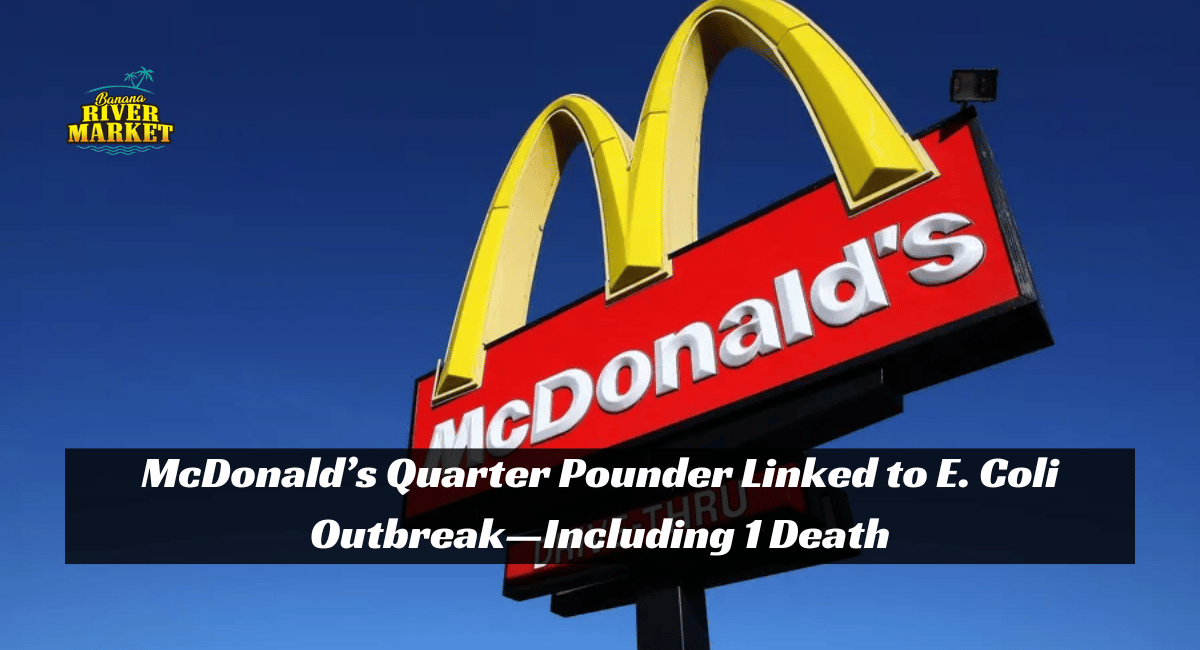The U.S. Centers for Disease Control and Prevention (CDC) has launched an urgent investigation into a recent outbreak of E. coli infections affecting 49 people across ten states. The outbreak is believed to be linked to McDonald’s Quarter Pounder burgers. As of October 22, 2024, there have been ten hospitalizations and one death related to the outbreak.
E. Coli Outbreak and the Quarter Pounder Connection
Many infected individuals reported eating McDonald’s Quarter Pounder hamburgers before falling ill, though it has not yet been confirmed which specific ingredient caused the contamination.
In response, in coordination with the CDC, Food and Drug Administration (FDA), and Food Safety and Inspection Service (FSIS), McDonald’s has initiated a recall of certain ingredients while the investigation is ongoing.
The CDC and McDonald’s are working with other public health authorities to track the outbreak’s source. Currently, fresh slivered onions and quarter-pound beef patties—both explicitly used in McDonald’s Quarter Pounders—are being scrutinized as potential carriers of the bacteria.
These ingredients have been pulled from McDonald’s kitchens in certain areas until the investigation is clarified.
Onions Possibly Linked to Contamination
Initial findings from the FDA’s traceback investigation point to fresh onions as a likely source of contamination. These onions are being investigated further to determine whether they were used in other food products or sold through different outlets.
The FSIS is also investigating whether the hamburger patties could be the source of the contamination if the beef were affected during processing.
States Affected by the E. Coli Outbreak
So far, cases have been reported in the following states:
- Colorado: 26 cases (including one death)
- Nebraska: 9 cases
- Wyoming: 4 cases
- Utah: 4 cases
- Oregon: 1 case
- Montana: 1 case
- Kansas: 1 case
- Iowa: 1 case
- Wisconsin: 1 case
- Missouri: 1 case
The illnesses occurred between September 27 and October 11, but health experts suspect the number of cases may be higher, as many cases may not have been reported yet. It can take three to four weeks for health departments to confirm and report cases related to outbreaks like this.
Health Risks and Hospitalizations
Among the 49 confirmed cases, ten people have been hospitalized. One individual developed a severe condition known as hemolytic uremic syndrome (HUS), a complication of E. coli infections that can cause kidney failure. Tragically, one person in Colorado has died due to the infection.
Symptoms of E. Coli and What to Watch For
E. coli infections can cause a range of symptoms, which typically begin three to four days after eating contaminated food. The most common symptoms include:
- Severe stomach cramps
- Diarrhea (often bloody)
- Vomiting
- Fever (above 102°F or 39°C)
- Dizziness and fatigue
Most people recover from E. coli infections without medical treatment within five to seven days. However, complications can arise, especially in young children, older people, or those with weakened immune systems. Hemolytic uremic syndrome (HUS), a potentially life-threatening complication, can develop in some cases, leading to kidney failure.
When to Seek Medical Attention
If you have recently eaten a McDonald’s Quarter Pounder and are experiencing any of the symptoms listed above, it is essential to contact your healthcare provider immediately. Even if symptoms seem mild, seeking medical advice early can prevent complications.
McDonald’s Response to the Outbreak
In response to the outbreak, McDonald’s has temporarily removed quarter-pound hamburgers from the menu in several states while the investigation continues.
The fast-food giant has also stopped using fresh slivered onions and quarter-pound beef patties in all its restaurants nationwide, as these ingredients are currently under scrutiny. McDonald’s has committed to fully cooperating with public health authorities to identify and resolve the source of the contamination.
What McDonald’s Customers Should Know
While McDonald’s has taken swift action to limit the spread of the contamination, customers must remain vigilant. If you have eaten a McDonald’s Quarter Pounder recently, be on the lookout for symptoms associated with E. coli infections and take action if necessary.
Remember that E. coli symptoms can take several days to appear, so monitoring your health closely during this time is crucial.
For now, McDonald’s has assured the public that they are doing everything they can to ensure the safety of their food, but it will take time for the investigation to pinpoint the exact source of the outbreak. Until then, customers are encouraged to stay informed through updates from the CDC and other health organizations.
Steps Being Taken by Health Authorities
The CDC, FDA, and FSIS work together to conduct a thorough investigation. This includes tracing the supply chain of the affected ingredients, testing samples, and analyzing data from reported cases. Public health officials urge anyone who suspects they may be ill from eating McDonald’s food to report their symptoms and seek medical advice.
In the meantime, health departments across the affected states are continuing to monitor and report new cases as they come in. As more information becomes available, the CDC is expected to issue further guidance on preventing additional cases and managing the outbreak.
Conclusion:
The E. coli outbreak linked to McDonald’s Quarter Pounders is a severe public health concern that has already resulted in 49 cases, 10 hospitalizations, and one tragic death. As the investigation unfolds, customers are urged to take precautions, watch for symptoms, and consult their healthcare providers if they have recently eaten a Quarter Pounder and are feeling unwell.
While McDonald’s has temporarily removed some ingredients from its menu, the situation remains fluid. Further updates will follow as health authorities continue their investigation. For now, the focus is on identifying the source of contamination and preventing additional cases. Stay informed and stay safe during this ongoing health concern.
READ MORE: TGI Fridays Is Reportedly Headed For Bankruptcy: Here’s What We Know

